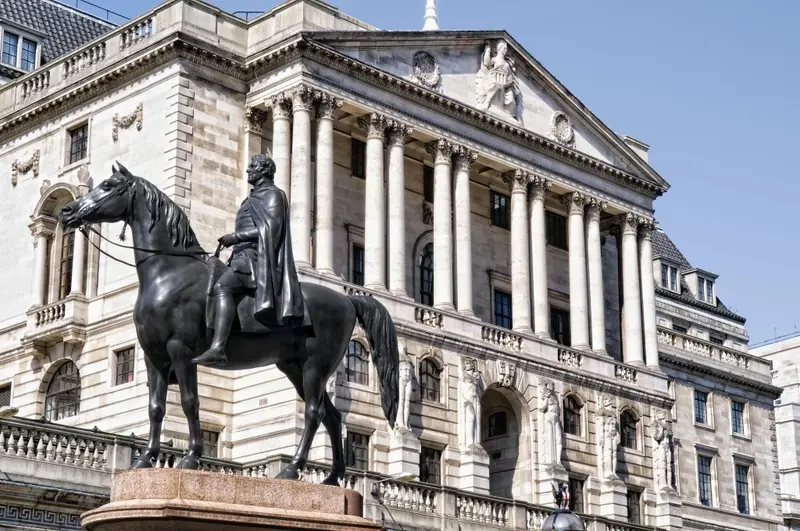
The mood was gloomy in London on Tuesday with stocks closing sharply in the red as investors were spooked by the Bank of England further intervening in the UK bond market on top of the IMF downgrading the global economic outlook.
The FTSE 100 index closed down 74.08 points, 1.1%, at 6,885.23. The FTSE 250 ended down 221.23 points, 1.3%, at 16,904.06, and the AIM All-Share closed 11.93 points down, 1.4%, at 787.70.
The Cboe UK 100 ended down 1.2% at 688.29, the Cboe UK 250 closed down 1.0% at 14,523.74, and the Cboe Small Companies ended down 0.8% at 12,526.36.
In European equities on Tuesday, the CAC 40 in Paris ended down 0.3%, while the DAX 40 in Frankfurt ended down 0.6%.
Global economic growth is expected to slow further next year, the IMF said on Tuesday. It downgraded its forecasts as countries grapple with the fallout from Russia's invasion of Ukraine, spiralling cost-of-living, and economic downturns.
‘This year's shocks will re-open economic wounds that were only partially healed post-pandemic,’ said International Monetary Fund economic counsellor Pierre-Olivier Gourinchas in a blog post accompanying the fund's latest World Economic Outlook.
‘The worst is yet to come and, for many people 2023 will feel like a recession,’ said Gourinchas.
In the UK, the economy is projected to grow at a rate of 3.6% in 2022, a 0.4% upgrade from the IMF's previous forecast in July.
However, growth will then fall sharply to just 0.3% in 2023 with the IMF downgrading its forecast by 0.2% from 0.5%. The forecasts, it should be noted, were prepared before the UK government unveiled its mini-budget, which caused turmoil in the markets.
The IMF added that there have been investor concerns about the UK's fiscal and inflationary outlook since the debt-financed tax cuts were announced.
The viability of the UK government's controversial budget is once again under fire.
UK Chancellor Kwasi Kwarteng will have to find spending cuts of more than £60 billion if he is to meet his target to get the public finances back under control, the Institute for Fiscal Studies has warned.
The leading UK thinktank said it was not possible to deliver those cuts through efficiency savings and ‘trimming the fat’ alone, and that it would require major cuts to public services.
Meanwhile, Citigroup's chief UK economist Ben Nabarro cautioned that the UK's basis for meeting its external financing needs was ‘increasingly precarious’ and that failure to take action could lead to an even worse situation than either the 1976 IMF crisis or Black Wednesday in 1992, when sterling was forced out of the European Exchange Rate Mechanism.
The Bank of England demonstrated its concern about the ‘material risk’ to financial stability in the UK, stemming from the recent volatility in bond markets.
In another intervention, the bank said it has widened the scope of its bond-buying programme, due to end this week, to include purchases of index-linked gilts.
The central bank said the measure is a ‘further backstop’ as it bids to restore orderly market conditions.
Its efforts have been met with some skepticism, however, as analysts suggest the volatility may well resume once the bond-buying scheme ends this week.
‘The fact the BoE has widened its support measures for the market by including index-linked gilts in its programme of government bond purchases will only serve to worry investors even more,’ said Russ Mould, investment director at AJ Bell.
‘The key sticking point is that the support measures are only scheduled to last until Friday. Will that be long enough, or will the Bank of England extend the support scheme? Extending it could go one of two ways - the market either applauds the move and breathes a sigh of relief or it gets even more worried, thinking that the extra time suggests the crisis is more severe than originally thought.’
Nevertheless, sterling found some respite on Tuesday. The pound was quoted at $1.1097 at the London equities close, compared to $1.1038 at the close on Monday.
The euro stood at $0.9719 at the European equities close Tuesday, up against $0.9700 at the same time on Monday.
Against the yen, the dollar was trading at JP¥145.70, slightly lower compared to JP¥145.72 late Monday.
Stocks in New York were mixed at the London equities close, with the DJIA up 0.6%, the S&P 500 index down 0.1%, and the Nasdaq Composite down 0.3%.
Brent oil was quoted at $94.62 a barrel at the London equities close Tuesday, down from $96.99 late Monday. FTSE 100 listed oil and gas producer Harbour Energy shed 4.4%.
Tesco and Sainsbury's edged up 0.6% and 1.3% respectively after sales growth in the 12 weeks to October 2. Online grocery retailer Ocado slumped 5.3%, after the Bank of America cut the target price for the stock.
In the midcaps, PureTech Health lost 6.1%. The biotech firm said takeover talks with San Francisco-based Nektar Therapeutics have been terminated.
‘These discussions were early in nature and the required announcement created the impression that discussions were more advanced than they were. Given the early stage of the discussions and the potential for an extended period of uncertainty, these discussions were terminated,’ the company explained.
Ferrexpo ended down 4.0%, after it said that its production has been temporarily suspended following a number of Russian missile strikes across Ukraine on Monday. It faces limited power supply, which is being prioritised for critical equipment required for essential services and local communities.
On AIM, Enwell Energy closed down 13%. The oil and gas firm also suffered from disruption due to Russian missile strikes in Ukraine.
Enwell operates three gas and condensate fields in the country: MEX-GOL, SV, and VAS.
It said production operations continue, but most other works have been suspended at the Mekhediviska-Golotvshinska and Svyrydivske fields. Enwell said there had also been considerable disruption to remedial and maintenance work at both sites, resulting in materially lower production volumes compared to last year.
Gold was quoted at $1,671.20 an ounce at the London equities close Tuesday against $1,668.45 at the close on Monday.
In Wednesday's UK corporate calendar, there are annual results from online clothing retailer Asos and business consultancy Kin & Carta.
The economic calendar for Wednesday has UK trade statistics, production index and GDP at 0700 BST, EU industrial production at 1000 BST. In the afternoon there's a speech from BoE chief economist Huw Pill at 1235 BST, followed by US producer price inflation at 1330 BST, and meeting minutes from the Federal Open Market Committee at 1900 BST.
Copyright 2022 Alliance News Limited. All Rights Reserved.




